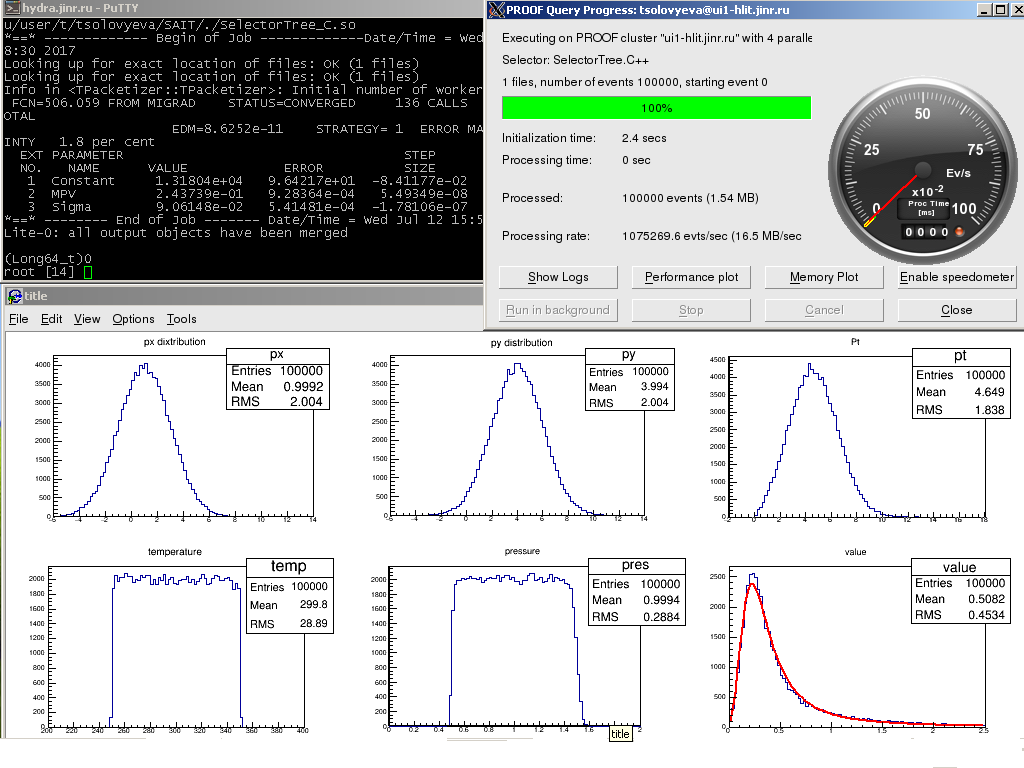PROOF - Tree Example
Consider an example in which information is read from four branches of a tree, calculated two additional values are filled in histograms, and one of them is fitted. First we give the code in which this problem is solved without PROOF.
A preliminary macro in which four random variables are generated, and the tree is filled:
void write_chain6 (std::string outputFileName ="myTree.root",unsigned int numDataPoints = 10000) {
TTree myTree ("myTree","Example Tree");
float px,py,value,temp,pres;
myTree.Branch("px",&px,"px/F");
myTree.Branch("py",&py,"py/F");
myTree.Branch("Temperature",&temp,"Temperature/F");
myTree.Branch("Pressure",&pres,"Pressure/F");
for ( int i=0;i< numDataPoints;++i) {
px=gRandom->Gaus(1.,2.);
py=gRandom->Gaus(4.,2.);
temp=gRandom->Uniform (250.,350.)+gRandom->Gaus(0.,0.3) ;
pres=gRandom->Uniform (0.5,1.5) *gRandom->Gaus(1.,0.02) ;
myTree.Fill();
}
TFile ofile (outputFileName.c_str( ),"RECREATE") ;
myTree.Write();
ofile.Close();
}
Macro for reading the tree (not a parallel version):
#include "TFile.h"
#include "TNtuple.h"
#include < iostream >
#include "TTree.h"
#include "TChain.h"
void read_from_tree(){
TFile* f=new TFile("myTree.root");
TTree* treeData=(TTree*)f->Get("myTree");
float px,py,pt,temp,pres,value;
treeData->SetBranchAddress("px",&px);
treeData->SetBranchAddress("py",&py);
treeData->SetBranchAddress("Temperature",&temp);
treeData->SetBranchAddress("Pressure",&pres);
TH1F* h_px=new TH1F("px","px dixtribution",100,-6,14);
TH1F* h_py=new TH1F("py","py distribution",100,-6,14);
TH1F* h_pt=new TH1F("pt","Pt",100,-2,18);
TH1F* h_value=new TH1F("value","value",100,0.,2.5);
TH1F* h_temp=new TH1F("temp","temperature",100,200.,400.);
TH1F* h_pres=new TH1F("pres","pressure",100,-0.,2.);
Int_t nentries=(Int_t)treeData->GetEntries();
for(Int_t i=0;i < nentries;i++){
treeData->GetEntry(i);
h_px->Fill(py);
h_py->Fill(py);
pt=sqrt(px*px+py*py);
h_pt->Fill(pt);
h_temp->Fill(temp);
h_pres->Fill(pres);
value=pt/(10.*0.05*(temp-300.)-0.2*(pres-1.));
h_value->Fill(value);
}
TCanvas* c=new TCanvas("c","title",20,20,1200,600);
c->Divide(3,2);
c->cd(1);
h_px->Draw();
c->cd(2);
h_py->Draw();
c->cd(3);
h_pt->Draw();
c->cd(4);
h_temp->Draw();
c->cd(5);
h_pres->Draw();
c->cd(6);
h_value->Draw();
h_value->Fit("landau");
}
We now turn to the parallel method of reading the tree. The TTree class implements the MakeSelector() method, which creates two files, Selector.h and SelectorTree.c, the so-called "skeleton" class or template to add. The following files show in black the instructions generated. automatically by the MakeSelector() method.
#ifndef SelectorTree_h
#define SelectorTree_h
#include < TROOT.h >
#include < TChain.h >
#include < TFile.h >
#include < TSelector.h >
class SelectorTree : public TSelector {
public :
TTree *fChain; //pointer to the analyzed TTree tree or TChain chain
// Leaf types ad
Float_t px;
Float_t py;
Float_t pt;
Float_t value;
Float_t Temperature;
Float_t Pressure;
// Branch lifts
TBranch *b_px;
TBranch *b_py;
TBranch *b_Temperature; //!
TBranch *b_Pressure; //!
SelectorTree(TTree * /*tree*/ =0) : fChain(0) { }
virtual ~SelectorTree() { }
virtual Int_t Version() const { return 2; }
virtual void Begin(TTree *tree);
virtual void SlaveBegin(TTree *tree);
virtual void Init(TTree *tree);
virtual Bool_t Notify();
virtual Bool_t Process(Long64_t entry);
virtual Int_t GetEntry(Long64_t entry, Int_t getall = 0) { return fChain ? fChain->GetTree()->GetEntry(entry, getall) : 0; }
virtual void SetOption(const char *option) { fOption = option; }
virtual void SetObject(TObject *obj) { fObject = obj; }
virtual void SetInputList(TList *input) { fInput = input; }
virtual TList *GetOutputList() const { return fOutput; }
virtual void SlaveTerminate();
virtual void Terminate();
ClassDef(SelectorTree,1);
};
#endif
#ifdef SelectorTree_cxx
void SelectorTree::Init(TTree *tree)
{
// The Init () function is called when the selector must initialize a new
// tree or chain. Usually, the addresses of the branches and pointers to them are set here.
// Usually there is no need to make changes to the generated code
// but if necessary, the program can be expanded by the user.
// Init () will be called many times when PROOF is running
// (once for each file processed).
// Set branch addresses and pointers to branches
if (!tree) return;
fChain = tree;
fChain->SetMakeClass(1);
fChain->SetBranchAddress("px",&px, &b_px);
fChain->SetBranchAddress("py",&py,&b_py);
fChain->SetBranchAddress("Temperature", &Temperature, &b_Temperature);
fChain->SetBranchAddress("Pressure", &Pressure, &b_Pressure);
}
Bool_t SelectorTree::Notify()
{
// The Notify () function is called when a new file is opened. it
// can occur either for a new TTree in TChain, or when a new TTree
// starts when using PROOF. Usually there is no need to make changes.
// into the generated code, but if necessary, the procedure can be extended with
// user The return value is currently not used.
return kTRUE;
}
#endif // #ifdef SelectorTree_cxx
#define SelectorTree_cxx
The following methods are defined in this file:
// Begin (): called every time a loop starts on a tree,
// convenient place to create your histograms.
// SlaveBegin (): called after Begin (), when PROOF is called only on
// secondary server.
// Process (): is called for each event, in this function you decide
// read and fill your histograms.
// SlaveTerminate: called at the end of the tree processing cycle, if PROOF
// invoked on secondary servers only.
// Terminate (): called at the end of the tree processing cycle
// convenient place to draw / fit histograms.
//
// To use this file, try the following commands for your Tree T:
//
// Root > T->Process("SelectorTree.C")
// Root > T->Process("SelectorTree.C","some options")
// Root > T->Process("SelectorTree.C+")
//
#include "SelectorTree.h"
#include < TH2.h >
#include < TStyle.h >
#include < TCanvas.h >
#include < iostream >
using namespace std;
UInt_t fNumberOfEvents;
TDatime tBegin,tNow;
TH1F *h_px,*h_py, *h_pt, *h_value,*h_temp,*h_pres;
void SelectorTree::Begin(TTree * /*tree*/)
{
TString option = GetOption();
tBegin.Set();
printf("*==* ------------- Begin of Job -------------");
tBegin.Print();
}
void SelectorTree::SlaveBegin(TTree * /*tree*/)
{
TString option = GetOption();
h_px=new TH1F("px","px dixtribution",100,-6,14);
h_py=new TH1F("py","py distribution",100,-6,14);
h_pt=new TH1F("pt","Pt",100,-2,18);
h_temp=new TH1F("temp","temperature",100,200.,400.);
h_pres=new TH1F("pres","pressure",100,-0.,2.);
h_value=new TH1F("value","value",100,0.,2.5);
fOutput->AddAll(gDirectory->GetList());
}
Bool_t SelectorTree::Process(Long64_t entry)
{
GetEntry(entry);
++fNumberOfEvents;
h_px->Fill(px);
h_py->Fill(py);
pt=sqrt(px*px+py*py);
h_pt->Fill(pt);
h_temp->Fill(Temperature);
h_pres->Fill(Pressure);
value=pt/(10.*0.05*(Temperature-300.)-0.2*(Pressure-1.));
h_value->Fill(value);
return kTRUE;
}
void SelectorTree::SlaveTerminate()
{
printf("\n *==* --------- End of Slave Job --------");
tNow.Set();
tNow.Print();
printf("Number of Events: %i, elapsed time: %i sec, rate: %g evts/sec\n",
fNumberOfEvents,
tNow.Convert()-tBegin.Convert(),
float(fNumberOfEvents)/(tNow.Convert()-tBegin.Convert()));
}
void SelectorTree::Terminate()
{
TFile hfile("MySelector_Result.root","RECREATE","MuonResults");
fOutput->Write();
TCanvas* c=new TCanvas("c","title",20,20,1200,600);
c->Divide(3,2);
h_px=dynamic_cast<TH1F *>(fOutput->FindObject("px"));
c->cd(1);
h_px->Draw();
h_py=dynamic_cast<TH1F *>(fOutput->FindObject("py"));
c->cd(2);
h_py->Draw();
h_pt=dynamic_cast<TH1F *>(fOutput->FindObject("pt"));
c->cd(3);
h_pt->Draw();
h_temp=dynamic_cast<TH1F *>(fOutput->FindObject("temp"));
c->cd(4);
h_temp->Draw();
h_pres=dynamic_cast<TH1F *>(fOutput->FindObject("pres"));
c->cd(5);
h_pres->Draw();
h_value=dynamic_cast<TH1F *>(fOutput->FindObject("value"));
c->cd(6);
h_value->Draw();
h_value->Fit("landau");
tNow.Set();
printf("*==* -------- End of Job ------- ");
tNow.Print();
}
Create a chain:
root [0] TChain* ch = new TChain ("treeMy", "MyTree")
Attaching the file to the root chain:
root [1] ch-> Add ("treeMy.root")
Open PROOF session:
root [2] TProof * proof = TProof::Open ("lite://","workers=12")
Turn on processing:
root [3] ch-> SetProof()
We process all the entries in this chain by calling functions in the SelectorTree file:
root [4] ch-> Process ("SelectorTree.C++")
Here is what you should see on your screens:


